| Article ID | Journal | Published Year | Pages | File Type |
|---|---|---|---|---|
| 7324813 | Journal of Experimental Social Psychology | 2014 | 15 Pages |
Abstract
Three studies examined ideological symmetries and asymmetries in political intolerance and prejudice toward political activist groups. Using both student and non-student samples, and two alternative methodologies for studying political intolerance, the results of these studies converge on three important and novel conclusions. First, consistent with the ideological conflict hypothesis, both liberals and conservatives were politically intolerant and prejudiced toward ideologically dissimilar groups, to similar degrees. Second, whereas political intolerance and prejudice are related intergroup phenomena, they have different threat-based antecedents. Specifically, whereas symbolic threat significantly predicted prejudice, it did not predict political intolerance of the same groups. Finally, the threat-based antecedents of political intolerance depended on the political objectives of the group itself. Across studies, only safety threat predicted intolerance of left-wing groups. In Studies 1 and 2, only realistic threat predicted intolerance of right-wing groups; however, Study 3 revealed that those effects are attributable to beliefs that right-wing groups are a threat to people's rights. Theoretical and practical implications of these findings are discussed, including their relevance to political intolerance and prejudice reduction interventions.
Related Topics
Life Sciences
Neuroscience
Behavioral Neuroscience
Authors
Jarret T. Crawford,
